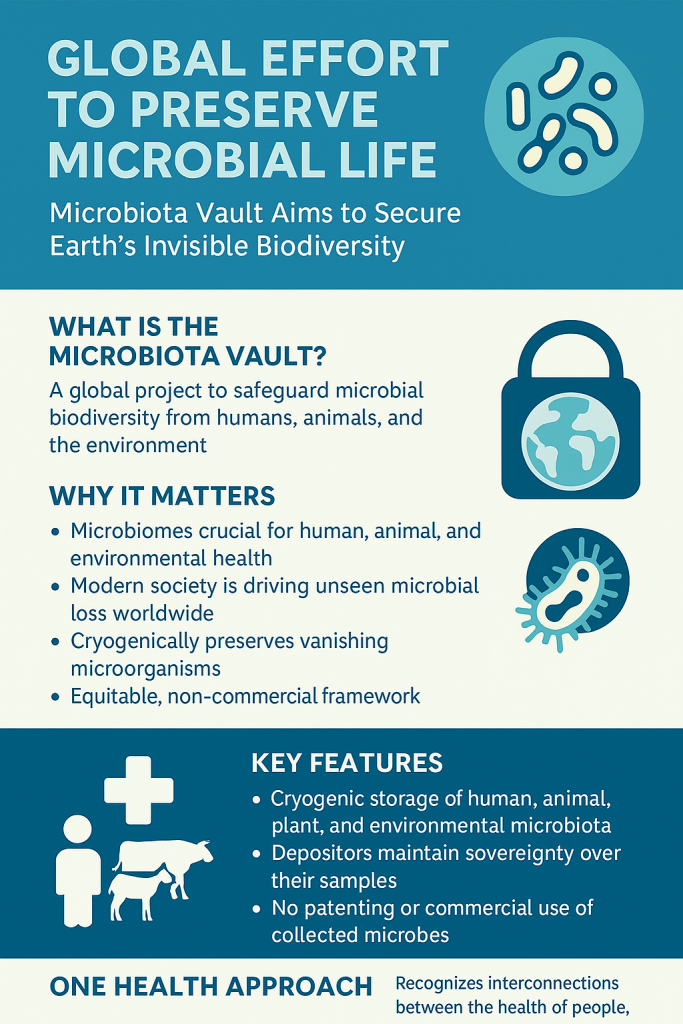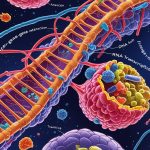In an ambitious move to combat the global loss of beneficial microbes, researchers have launched the Microbiota Vault Initiative (MVI)—a global project aimed at preserving the invisible microbial world vital to human, animal, and environmental health.
Inspired by the Svalbard Global Seed Vault, this microbiome-focused counterpart secures cryogenically stored samples from across the globe, ensuring that future generations retain access to essential microbial ecosystems that are rapidly vanishing due to modernization, antibiotic use, urbanization, and climate change.
“Microbial life is disappearing even before we understand its importance,” said Dr. Maria Dominguez-Bello, lead author and co-founder of the MVI. “We must preserve this invisible heritage to safeguard our planet’s health.”
Why It Matters
Microbes play crucial roles in:
- Human health: supporting immunity, digestion, and disease resistance.
- Animal health: enhancing gut function and pathogen resistance.
- Environmental resilience: regulating nutrient cycles, soil fertility, and climate systems.
Yet modern lifestyles, overuse of antibiotics, and environmental degradation are eroding this delicate web. The Microbiota Vault addresses this crisis with an equitable, non-commercial framework that allows global depositors to store their microbial samples with full sovereignty.
Key Features of the Microbiota Vault
- Cryogenic preservation of human, animal, plant, and environmental microbiota
- Depositor sovereignty: Only original collectors control their samples
- No patenting or commercial research—just conservation
- Global reach: Initial deposits from Benin, Ghana, Laos, Brazil, Ethiopia, Thailand, and Switzerland
- Annual Global Microbiome Network Symposia (GloMiNe) to foster collaboration
- MIxS metadata standards for traceability and open-access DNA sequencing (by request)
One Health Approach
The MVI aligns with the One Health philosophy, recognizing that the health of people, animals, and ecosystems is interconnected. Losses in environmental microbiota—such as Arctic permafrost bacteria or gut microbes like Bifidobacterium infantis—have cascading effects on chronic diseases, biodiversity loss, and climate change.
“Preserving microbial diversity today is an investment in tomorrow’s restoration tools,” added co-author Dr. Jack Gilbert.

Future Outlook
The initiative plans to expand its collections beyond human and food-associated microbes to include:
- Rare soil microbiota
- Wildlife gut microbiomes
- Aquatic and atmospheric microbes
Though functional restoration from frozen samples is still speculative, storing microbiota now offers critical opportunities for future therapies, ecosystem recovery, and scientific research.
References
Dominguez-Bello, M. G., Steiger, D., Fankhauser, M., Egli, A., Vonaesch, P., Bokulich, N. A., … & Blaser, M. J. (2025). The microbiota vault initiative: safeguarding Earth’s microbial heritage for future generations. Nature Communications, 16(1), 1-6. https://doi.org/10.1038/s41467-025-61008-5







